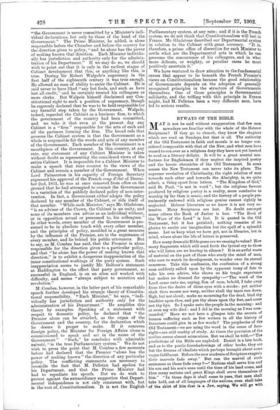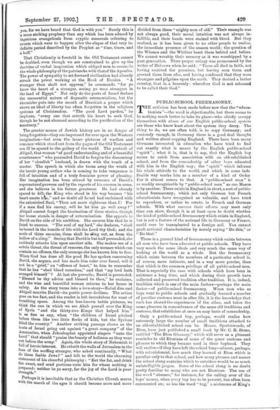nowadays are familiar with the whole of the Hebrew Scriptures?
If they go to church, they know the chapters which are read on Sundays, but that is all. The authority of the Government. In this country, at any of the Government. Each member of the Government is a of the Old Testament in faith and morals is no longer con- mouthpiece sidered comparable with that of the New, and what men have glories to excite our imagination but the spell of a splendid name. Let us keep what we have got, not in libraries, but in mind, where alone the life of letters is preserved.
sight—are still worthy of study. At times the prevision of the
you, for we have beard that God is with you." Surely this is `a more striking prophecy than any which has been educed by ingenious evangelicals from cryptic numerals referring to events which were to happen after the elapse of that very in- definite period described by the Prophet as " time, times, and a half."
' That Christianity is foretold in the Old Testament cannot be doubted, even though we are constrained to give up the doctrine of verbal inspiration which obliged men to reconcile the whole philosophy of the patriarchs with thatof the Apostles. The power of sympathy to set forward civilisation had already struck the priest working at the Book of Exodus. " A stranger thou shalt not oppress," he commands, " for ye know the heart of a stranger, seeing ye were strangers in the land of Egypt." Not only do the poets of Israel declare the unessential nature of dogmatic ceremonialism, but the chronicler puts into the mouth of Hezekiah a prayer which shows an ideal of liberty too often forgotten in the religious systems of Christendom. "The good Lord pardon," he implores, "every one that setteth his heart to seek God, though he be not cleansed according to the purification of the sanctuary."
The greater scenes of Jewish history are in no danger of being forgotten—they are impressed for ever upon the Western imagination—but even the lesser pictures of warfare and romance which stand out from the pages of the Old Testament can ill be spared to the gallery of the world. The portrait of Abigail, that woman "of good understanding and of a beautiful countenance" who persuaded David to forgive the discourtesy of her " churlish " husband, is drawn with the touch of a master. The speech in which she turns away the wrath of the heroic young outlaw who is coming to take vengeance is full of intuition and of a truly feminine power of pleasing. Her imagination has been stirred by rumours of David's supernatural prowess and by the reports of his success in arms, and she believes in his future greatness. He had already spared to killtthe King who stood in his way because " his heart smote hail," and no doubt all Israel had exclaimed with the astonished Saul, " Thou art more righteous than I! For if a man find his enemy, will he let him go well away ?" Abigail cannot forget the fascination of these stories, though her house stands in danger of extermination. She appeals to David on the side of his ambition. She assures him that he is fated to success. " The soul of my lord," she declares, " shall be bound in the bundle of life with the Lord thy God; and the souls of thine enemies, them shall he sling out, as from the hollow of a sling." Seeing that David is but half persuaded, she suddenly attacks him upon another side. She makes use of a subtle threat, the threat of remorse, the only menace which can contain no offence, the only scourge she has known him to fear. When God has done all the good He has spoken concerning David, she argues, and has made him ruler over Israel, will it not be a "grief," an "offence of heart," to him to remember that he has "shed blood causeless," and that "my lord hath avenged himself " ? At last she prevails ; David is persuaded. " Blessed be thy advice and blessed be thou," he exclaims, and the wise and beautiful woman returns to her house in safety. As the story turns into a love-story—Nabal dies and Abigail marries David—its poetic power declines. The action goes on too fast, and the reader is left incredulous for want of breathing space. Among the less-known battle pictures, we think the one in which we see Ahab prevail over the King of Syria "and the thirty-two Kings that helped him" is as fine as any, when " the children of Israel pitched before them like two little flocks of kids, but the Syrians filled the country." Another striking passage shows us the hosts of Israel going out against "a great company" of the Ammonites, when Jehoshaphat appointed singers "unto the Lord" that should " praise the beauty of holiness as they went out before the army." Again, the whole story of Nehemiah is full of heroic interest. He rebuilt the walls of Jerusalem in the face of the scoffing stranger, who asked continually, " What do these feeble Jews ? " and left to the world the charming statement of his cheerful philosophy : " Eat the fat, and drink the sweet, and send portions unto him for whom nothing is prepared: neither be ye sorry, for the joy of the Lord is your
strength."
Perhaps it is inevitable that as the Christian Church moves with the march of the ages it should become more and more divided from these "mighty men of old." Tbeir example was not always good, their moral intuition was not always in- fallible, and their hands were stained with blood. But they realised, as it has been given to no other people to realise, the immediate presence of the unseen world; the question of the Whence and the Whither beset them behind and before. We cannot worship their memory as it was worshipped by a past generation. Their proper eulogy was pronounced by the writer of Hebrews when he said : " These all died in faith, not having received the promises, but having seen them and greeted them from afar, and having confessed that they were strangers and pilgrims upon the earth. They desired a better country, that is, a heavenly : wherefore God is not ashamed to be called their God."











































 Previous page
Previous page